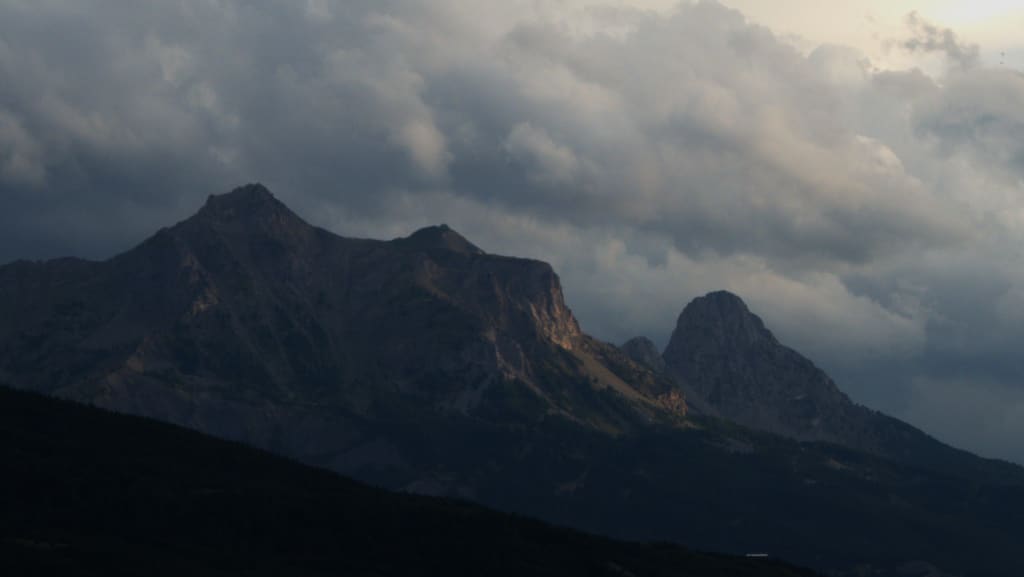
Being surrounded by mountains can make us realize how big and vast nature is. It is famously said by Schopenhauer that we can feel how little we are as humans and that the beauty of the nature of nature has the capacity to make us forget ourselves altogether. Schopenhauer has argued in his book “The World as Will and Representation” that we can experience the sublime while being engaged in watching the splendor that is everywhere around us. In this work, he describes the sublime as an experience that arises when we are confronted with the vastness and power of nature, which makes us aware of our own smallness and insignificance. Art too, says Schopenhauer, has this very same capacity of making us experience the sublime, dissolving our very own ego.
Experiencing the sublimation of our ego, we forget for a moment our very own existence. I myself have always been interested in these types of experiences and am therefore happy to read phenomenological accounts of these sorts of experiences. How do they come about? What do people feel when they experience a certain kind of state? And so on.
Schopenhauer, however, does seem to mainly reserve this concept for talking about a particular kind of experience that can be brought about by art or more general beauty. But I strongly sense that others have talked about this type of experience but in a different context.
Take for instance Lao Tzu, a Chinese philosopher who introduces the concept of wu-wei in his main Daoist work: “Tao Te Ching”. Wu-wei is often translated as non-action, but it would be more accurate to call it a state in which one is fully absorbed in being in the world and one fully lives in the moment, which also would result in an absolving of the ego. This state causes one to lose the illusion that the ego is a stable entity that persists through time.
In his essay “Wei-Wu-Wei: Nondual Action,” David Loy discusses the concept of wu-wei and its implications. He writes, “no awareness of an agent that is believed to do the action distinct from the objective action done” . We could take this to mean that whilst being in a state of wu-wei, we would not experience any form of separation between our individual selves and the actions brought about by it; it would make us even question the whole idea of who or what is even doing the acting in the first place.
Walking in the mountains can surely render us more apt for these kinds of experiences. Surrounded by nature’s beauty and engaged in a simple and repetitive task, our minds start to wander. Our creative sources are getting turned on; we can feel alive. Nietzsche even claims that our best thoughts arise during walks in the mountains, saying “All truly great thoughts are conceived while walking.” ― Friedrich Nietzsche, Twilight of the Idols. He also does not shy away from mocking lazy thinkers who sit down for thinking.
Perhaps this meditative act of walking could make us forget our feet, becoming once again whole with nature. We can call ourselves lucky if we can pick up small pieces of such an experience while we are enjoying a stroll through the mountains. But the goal, which can’t actually be a goal if we want to reach it is to have a more stable experience of the sublime. That’s at least what I think wu-wei is hinting at. It doesn’t sound like they are speaking of just some sort of fleeting, very short experience. They seem to be talking about a certain way or state of being that we can enjoy for longer periods of time, perhaps making it even our default state. Paradoxically, we can only achieve this type of being by not wanting to achieve it because it is not something that can be achieved; it is not a goal. It’s simply an experience in itself.
About the Creator
Aomame
Got a degree in philosophy, social policy and education. I'm very interested in philosophy, pscyhology, sociology and even some more spiritual writings. I also enjoy listening and producing music.
Enjoyed the story? Support the Creator.
Subscribe for free to receive all their stories in your feed. You could also pledge your support or give them a one-off tip, letting them know you appreciate their work.






Comments
There are no comments for this story
Be the first to respond and start the conversation.